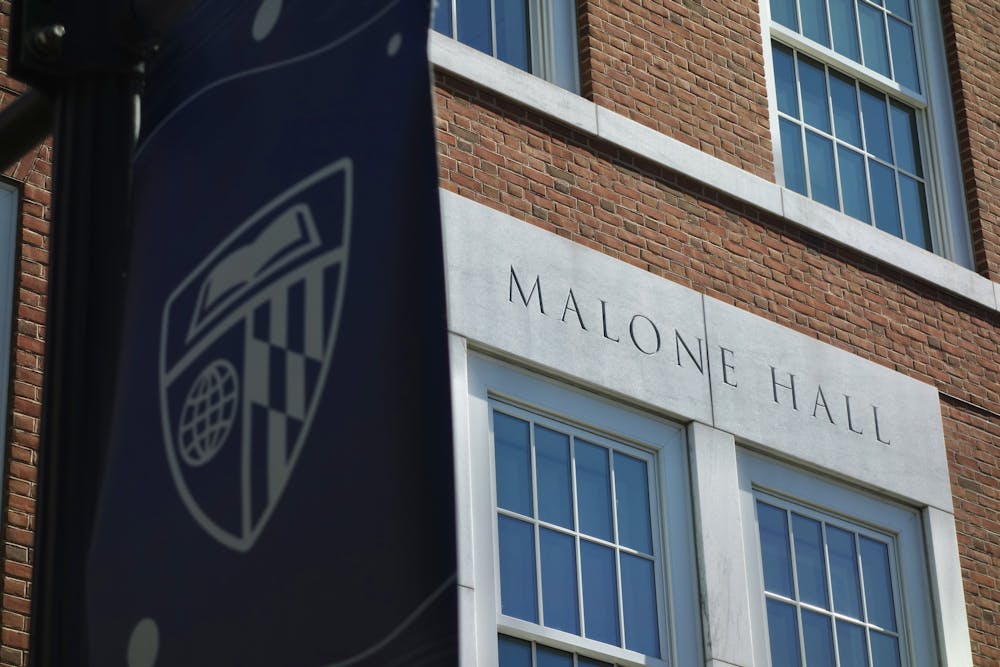On June 2, President Ronald J. Daniels announced a series of budget cuts facilitated by the Faculty Budget Advisory Committee and the Johns Hopkins University Council to offset recent federal funding reductions. For academic departments, these initiatives included pausing annual pay increases for most employees, freezing hiring for new and existing staff positions, slowing capital projects involving research and reducing discretionary spending on travel and professional services.
Mahler Revsine, a third-year Computer Science (CS) doctoral student and a steward for Teachers and Researchers United (TRU-UE), the University’s graduate worker union, shared his experience with budget cuts in the Computer Science Department in an interview with The News-Letter. Revsine also currently represents a student who was dismissed from the University due to the lack of backing by a formal principal investigator (PI) in a grievance hearing between TRU-UE and the University. Together, Revsine pieces the story of the CS department amid funding cuts.
Department as a Whole
In an email to The News-Letter, the University stated that the budget cuts have not inhibited the department’s ability to offer academic programming and industry resources. Moreover, the number of PhD students has grown despite administrative changes cutting research opportunities.
“Despite the recent challenges posed by federal funding cuts, graduate opportunities in the Whiting School of Engineering are operating from a position of strength. The department continues to offer robust academic degree programs,” a University spokesperson wrote. “Notably, CS PhD enrollment has grown from 216 students in 2024 to 224 in 2025, reflecting sustained student interest and the department’s capacity to support advanced study.”
Revsine confirmed that, according to a CS town hall meeting in September, the number of PhD students remains the same from the past academic year. However, Revsine added that, within the CS department, departmental events have been reduced and researchers are not traveling to conferences as much as before. PIs have to limit how much students can travel as they have a limit on how much they can spend per student on a conference travel.
“[The cost for conference travel] is so small that you can’t do anything with it. I have some friends who were told that they could go to a conference [before 2025], but they had to go back on that once the new administration came in,” Revsine said.
Alex’s Story
Revsine transitioned into the details of the fourth-year CS doctoral student, who opted to remain anonymous for this article and use the pseudonym “Alex.” In 2024, Alex’s advisor left the University to pursue a different job, independent of any budget cuts or Alex’s performance. Revsine highlighted the importance of a PI as a doctoral student, emphasizing the gravity of the PI’s departure.
“When your PI leaves the university, you're kind of screwed, because, as PhD students, your PI is your lifeline. They're your boss. They're your source of funding. They do everything for you. When this happened, this student was left without a lab,” Revsine stated.
Alex was involved in a study focusing on a niche, underserved area of CS, so they did not have many options for other labs to potentially join. However, Alex was also responsible for curating and assisting a course as a teaching assistant (TA) in this field of study. According to Revsine, Alex continued to work as a TA, overhauling the course with new technology and gaining a new passion for teaching, even enrolling in a course to prepare for University lecturing.
“Even though [Alex] didn't have a direct supervisor, they were able to work with a different professor, and they worked on a research project that was eventually published in some capacity at a conference, with their name on the paper,” Revsine noted. “[...] All this to say, while their advisor left the school, they were instrumental in teaching and doing research at the University.”
Revsine said that on April 30, Alex received a letter from the department saying Alex had four months to find a new advisor or they would be terminated from the program. Revsine emphasized the unfair action against Alex due to a lack of prior communication and access to alternative labs, driven by budget cuts to the department.
“Before this April 30 deadline, [Alex] didn't have any sort of communication from school saying that they had to find a new PI; there was no sort of official warning or anything like that. [...] [Alex] collaborated with a few different professors, but nobody had the funding or space in their lab to take [Alex]. And also, at the time, [Alex] wasn’t feeling any pressure to find a new PI, because they hadn't officially been warned,” Revsine stated.
In late July, Alex reached out to Revsine and a fellow steward to ask for TRU-UE’s help, which led to the filing of a grievance stating that the University was putting unfairly large pressure on the student without appropriate help. On Sept. 8, the student was dismissed from the University due to an inability to find a new PI, and the grievance filing prompted a new hearing.
Revsine said that Alex reached out to many professors over the summer, even using the help of a University-appointed advisor, but their search was unsuccessful; all professors explained that they had no additional funding to take on another student, especially in the underserved area of Alex’s concentration.
“Yeah, so I think, combined with what I know about all the budget cuts, I feel like this student basically was given an impossible deadline to meet, where there was just nobody that could have taken them on,” Revsine added.
According to Revsine, while Alex did reach out to faculty members for help, they opted primarily for TRU-UE’s support.
“I imagine that they felt sort of isolated. I mean, they didn't have a lab, which is like a common way that people have a support system, and our only communications really were with these people from the department who weren't very helpful,” Revsine said.
Alex is currently in a nonpaid role and waiting for the grievance hearing results. Revsine said the department should step up to pay Alex due to their contribution to the university.
“[TRU-UE] has very clear language in our collective bargaining agreement that students are guaranteed five years of funding. And frankly, the only reason why this is an issue in the first place is because the department's being stingy and not paying for this student,” Revsine asserted. “If there was a situation where you could pick whatever lab you wanted, the department would foot the bill if there was any sort of gap in funding.”
The University holds a $13 billion endowment to assist in federal research funding cuts, which Revsine argues can assist Alex’s case.
“If [the University] is serious about maintaining their status as one of the elite research universities of the world, they need to give back to the people that make that research possible. They'll say that they are out of money, because probably their higher ups told them they're out of money. Ultimately, they have a massive bank account. If academia is under attack, that is the exact time to dip into that bank account,” Revsine stated.
In a statement to The News-Letter, the University mentioned new research support programs, including Pivot and Bridge Grants for researchers with canceled federal funds, to help affected workers. The University also offers editorial services through Editorial Assistance Services Initiative (EASI) for no additional charge. Further, PhD research completion grants are provided directly to students and postdoctoral researchers with terminated awards.
“[We] remain committed to supporting our students, researchers, and academic programs, even in a challenging financial climate,” a University spokesperson stated.
However, Alex’s case did not involve canceled federal funds; no available resources centered around a student without a PI or difficulties getting into research groups.
According to on background information, the University confirms that graduate program academic dismissals are not linked to budget cuts.





